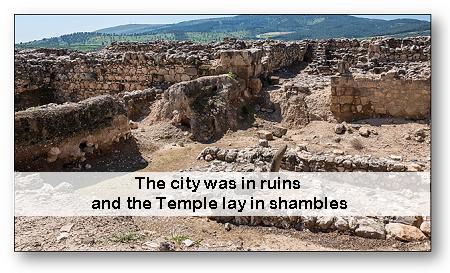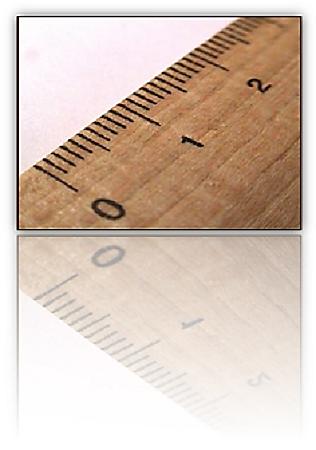The God of Then Is the God of Now
The God of Then Is the God of Now
Read Zechariah 2:1-5

The transition from one year to the next is a time for special reflection about where we are, where we have been, and where we are going. There are always reasons for praise and thanksgiving in remembrance of what the Lord has done; there are usually regrets for personal failures. There is always the resolve not to fail again and the expectancy that the Lord will do even greater things in the days ahead. But too often in our assessment, we tend to discouragement when things are not what we think they should be.
Though not at the threshold of a new year, the population of Judah that returned to Jerusalem after the Babylonian exile was at the threshold of a new day. They had returned to the land in obedience; they were where they were supposed to be; but nothing was right. The city was in ruins and the Temple lay in shambles. They were not experiencing the expected blessing they assumed would accompany their return to the Promised Land. Ezra records some of the discouragements and oppositions faced by the people. In His goodness, God raised up Zechariah, the prophet of hope, to address the discouragement factor. Significantly, Zechariah’s name means “Jehovah remembers”; that is something God’s people should never forget. Zechariah encouraged the people and motivated them to kingdom service by directing their attention to God’s unfailing purpose and plan for them. Aspects of the plan involved the distant future, but the timing of the promise was irrelevant to the fact of it. The hope was certain. God transcends time, whether past or future, so what we can learn about the God of “then” is always applicable to “now” because He changes not.
As we approach a new year, I want to learn from Zechariah’s word of hope to the post-exilic inhabitants of Jerusalem that God’s purpose for His people is greater than their expectations. That was true then; it is true now.
Zechariah 2 is the third in a series of eight night visions that the Lord gave the prophet addressing the whole glorious scope and sequence of His purpose and plan. In this vision, Zechariah sees a man with a measuring line that is about to measure Jerusalem and teaches three wonderful truths for consideration:
- God’s purpose for His people is greater than expectations (vv. 1-5);
- God’s protection of His people gives confidence for duty (vv. 6-9); and
- God’s presence with His people is reason for joy (vv. 10-13).
In this little study, we are going to think especially on the first truth for encouragement as we look ahead to the coming year and learn the principal lesson of the vision that Paul sums up in the amazing words of Ephesians 3:20. God is “able to do exceeding abundantly above all that we ask or think.”
Faith’s Expectations are Great⤒🔗
The mission of the man with the measuring line was to mark the borders of Jerusalem to identify the “city limits.” The mission itself was no small demonstration of faith, for in a very real sense there was nothing to measure. As far as the eye could see, the city was in total ruin. The rubble of walls demolished in the Babylonian destruction cluttered the ground, and the once glorious Temple lay in ruins. The evidences of past sins and failures were overwhelmingly obvious. Sight saw nothing but devastation, but faith was able to look beyond the debris to envision a restored city. This was not just wishful thinking but an expression of faith in God’s promise. Jeremiah had recorded God’s hopeful words prior to the exile:
I know the thoughts that I think toward you, saith the Lord, thoughts of peace, and not of evil, to give you an expected end.Jer. 29:11

Part of those divinely peaceful thoughts was God’s good word that they would return to this place (Jer. 29:10-14). Measuring the city limits was in essence claiming the promise that God would again be jealous for His people and return to them in mercy (1:14-16). It is always good and proper to act according to God’s promises.
But yet, to measure is to mark borders, to set limits. Faith expresses the confidence that God will keep His word; but sometimes sight interferes and interjects a bit of caution lest we believe too much. So often the weakness of faith is evident in its exercise. There is always a risk of believing too much lest we become disappointed when what we perceive to be the way God should work does not look like our notions. This is where the man with the measuring line was, and it is where so many Christians today tend to be as well. We know and believe what God has said, yet sometimes our reason is clouded by perception and experience that somehow prevents us from claiming all the riches we have in Christ or praying for things “too big.” We believe; it should be our prayer that God will help our unbelief.
God’s Purpose is Greater←⤒🔗
In his vision, Zechariah sees an angel that approaches the man with the measuring line and essentially instructs him to stop measuring the city. Measuring the city then was premature because “Jerusalem shall be inhabited as towns without walls” (v. 4). To mark the city limits was impossible because in God’s plan there would be no walls to mark the borders or limits. Here is the remarkable lesson: God’s purpose transcends our limitations to grasp it, and measuring the fullness of God’s blessing is impossible. That was true in Zechariah’s day; it is true in our day as well.
The text gives two reasons for the prohibition to stop trying to measure the city walls. In the ancient world, walls served two purposes: to mark territory and to provide defense. The two explanations address both of these purposes. First, there will be no walls to measure because the population of the city cannot be contained (“the multitude of men and cattle therein” [v. 4]). Years earlier, Isaiah gave the same instruction:
Enlarge the place of thy tent ... for thou shalt break forth on the right hand and on the left; and thy seed shall inherit the Gentiles.Isa. 54:2-3
In the same passage, the Lord says, “For a small moment have I forsaken thee; but with great mercies will I gather thee”Isa. 54:7
In God’s purpose of grace, citizenship in His kingdom extends to and includes people from every race on earth (see Rev. 7:9). With this explanation, the Lord directs attention away from the physical city to that spiritual city and kingdom of far greater importance than brick and mortar. It points to the unrelenting advance of Christ’s church.

Second, there will be no wall to measure because God’s presence provides inviolable security: “I ... will be unto her a wall of fire round about, and will be the glory in the midst of her” (v. 5). Later on, Zechariah describes a scene of peace where those who are most susceptible to danger (the young and old) are in the most dangerous places (the city streets) but are safe and secure because the Lord is “returned unto Zion, and will dwell in the midst of Jerusalem” (8:2-5). It appears to be a peace that is too marvelous for human comprehension, but it is not anything extraordinary to God (8:6). His presence makes the difference, and if God be for His people then none can be against them (Rom. 8:31) – at least, not in a way that really matters.
So as we anticipate what the next while is going to bring our way, we should be encouraged by Zechariah’s vision, which is as relevant to us in the twenty-first century AD as it was to those in the sixth century BC. The God of then is the God of now. It is good to know that God’s people in every age are part of His unfailing plan of grace. Let us be bold to ask of Him great things regarding our work in His kingdom, knowing and believing that He is able to do far more than we can ask or even think. Let us put away the measuring line.

Add new comment